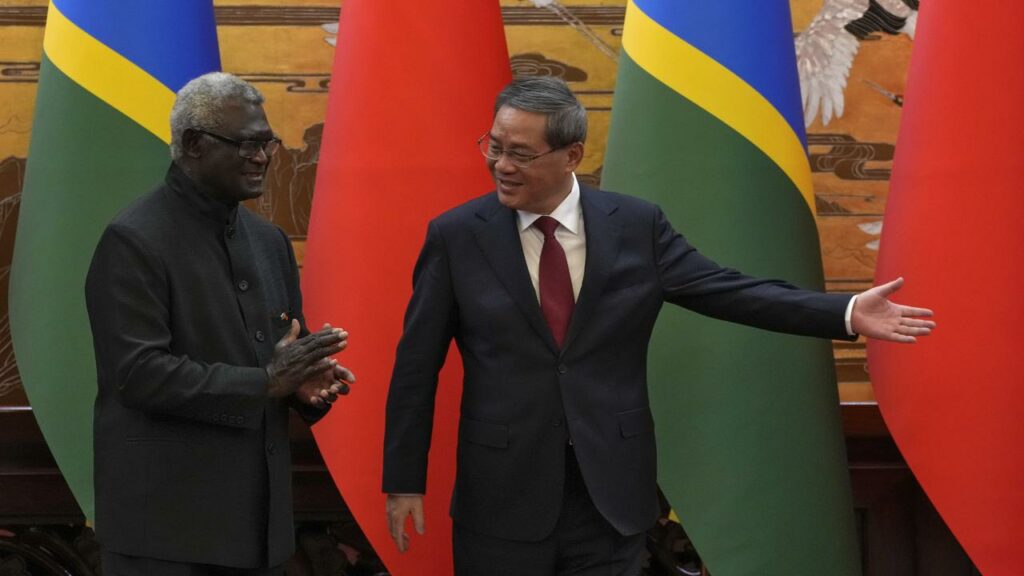Contest for Pacific influence shows no sign of slowing
Dominic Giannini |

It’s often said a picture is worth a thousand words, but when photos emerged of a Pacific leader receiving the red carpet treatment in China, only four words were needed.
Security partner of choice.
Australian politicians pounced on the phrase when peppered with questions about the images of Solomon Islands Prime Minister Manasseh Sogavare.
But Mr Sogavare warned Australia’s title of preferred partner could not be taken for granted.
“It takes only nine hours’ flight from China to land forces here,” he said.
It was a longer flight for the US secretaries of state and defence who landed in Brisbane for the two on two AUSMIN talks with their Australian counterparts as a 30,000 multinational force conducted war games.
Chinese influence and aid in the Pacific were on the agenda as concerns remain about what a Chinese foothold in the region means, especially as the Solomon Islands and Vanuatu mull standing up their own militaries.
Carol Li, who works with the foreign policy think tank Pacific Forum and has written about China’s Belt and Road initiatives in Oceania, said there should be no immediate cause for alarm “but it’s something we should be paying attention to”.
“It’s kind of signalling to other nations that there is a need that needs to be met.”
Pacific affairs expert Graeme Smith said both nations could benefit from some sort of natural disaster quick response force but there are questions about why an armed military needed to be stood up.
“The big question is what is the external threat that they face? And it’s not immediately obvious in the case of either army,” he said.
The associate professor said the Solomon Islands had a sobering history of weapons falling into the wrong hands and could be used in a civil war during periods of widespread civil unrest.
“It should certainly give any Australian policymakers who are thinking of sending over semi-automatics pause for thought before they just send over the gun and hope that it all works out,” he said.
“Certainly, twenty odd years ago it didn’t all work out with the munitions falling into the hands of the Malaita Eagles and forces like that.”
He added that the militarisation of Pacific nations could also result in coups and crackdowns stemming from longstanding internal divisions.
All of this would add to regional uncertainty, especially as Beijing continues to muscle its way into the region.
The US is also trying to pivot back to the Pacific with China’s powerplay causing a national security headache for both Washington and Canberra due to the threats Beijing’s military could pose to trading and shipping routes.
Rob York, program director for regional affairs at the Pacific Forum, said China saw itself as the natural leader of a new Asian order.
“Its ascendancy and its expansion in those regions present an obstacle not only to the United States, not only to Western countries but to countries that value freedom,” he said.
Australia and the US are keen to prevent China from embedding itself too deeply in any Pacific military or law enforcement body.
One of the biggest issues for island nations in the Pacific is cracking down on illegal and unreported fishing.
The US Coast Guard is now in talks with Pacific Island nations to expand maritime surveillance and law enforcement operations.
The Australian Federal Police have also just opened up a new police and justice precinct in partnership with Vanuatu to expand the reach of the local police force.
Earlier this year, the US signed a defence deal with Papua New Guinea.
The deal attracted criticism in PNG, with concerns it could undermine the country’s “friends to all, enemies to none” foreign policy and risk militarising the island.
Negotiations for a similar defence pact between Canberra and Port Moresby have since stalled.
PNG Prime Minister James Marape said the delays stemmed from the need to ensure his nation’s sovereignty wasn’t affected by “certain wordings and provisions” following criticism of the US deal.
Australia has previously committed to redeveloping the Lombrum navy base in PNG.
Australian Rear Admiral Brett Sonter said any decisions about the base were a matter for PNG.
“Any decision about Lombrum is for the Papua New Guinean government and we respect that,” he said.
Meanwhile, China and the US continue to court Pacific island nations.
There will also be a second US-Pacific summit in September after President Joe Biden convened an inaugural meeting at the White House.
The Pacific Islands Forum will be held in the Cook Islands in November.
The forum rejected a region-wide security agreement proposed by Beijing after the Solomons Islands deal was signed.
For now, the contest between the US and China for regional power and influence shows no signs of slowing down.
AAP